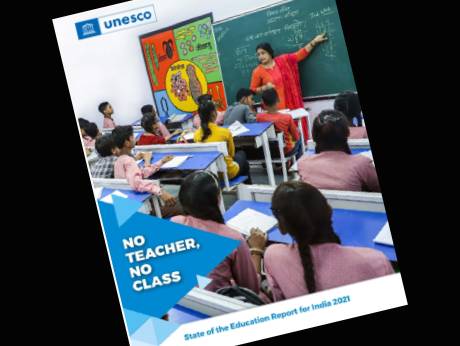
New Delhi, October 7 2021: The United Nations Educational, Scientific and Cultural Organization (UNESCO) has published its 2021 State of the Education Report (SOER) for India: “No Teacher, No Class”.
This third edition of the State of Education Report, focuses on the theme of teachers, teaching and teacher education, underscores that the work of teaching is complex. It attempts to provide an understanding of key aspects of the teaching profession, provides a profile of the 9.6 million teaching workforce, as well as the challenges of their intricate teaching routine and their professional development.
The report also looks at teachers’ experience of ICT and the effect of the COVID-19 pandemic on the teaching profession. The ongoing pandemic has drawn attention to the centrality of the profession and the importance of quality of teaching. During this unprecedented health crisis, most teachers were found to have positive attitudes and beliefs about integrating technology in education, even though they perceived a lack of professional skills. The Report has been developed by an expert team of researchers in the Tata Institute of Social Sciences, Mumbai, led by by Prof. Padma M Sarangapani, working with the UNESCO Office in New Delhi.
The report finds that as many as 19% of the 11.16 lakh teaching positions country-wide, are vacant at the moment. And there are 1.2 lakh schools with just one teacher --89 per cent are in rural areas. The working conditions of teachers in the Northeast are poor and there is a marked rural-urban disparity in terms of basic amenities as well as information and communications technology (ICT) infrastructure
Access to the internet in schools remains a challenge and is 19 per cent all over India, 14% in rural and 42% in urban areas. Surprisingly so called IT-industry-intensive states fare very badly when it comes to Internet in schools: Karnataka is ranked lowest in South India – with just 12% schools having internet. Telangana (18 per cent) and Andhra (17 %) are two other states, whose high level of IT business has not percolated to the education sector.
The union territory of Chandigarh is ranked the highest with 97 per cent, followed by Kerala (88 per cent), Puducherry (67 per cent), Goa (40 per cent) and Maharashtra and Tamil Nadu ( both 34 percent).
Overall availability of computing devices (desktops or laptops) in schools is 22%, 18% in rural areas.
The report concludes with a set of ten action-oriented recommendations to address the challenges facing the teaching profession in India, and thus help achieve the NEP 2020 vision and objective – “Ensuring quality education for all in the country”.
The ten recommendations are:
The National Education Policy (NEP), adopted in 2020, acknowledges teachers as crucial elements in the learning process, while stressing the importance of their recruitment, continuous professional development, good work environment and service conditions.
Says Eric Falt, Director, UNESCO New Delhi: “India has made enormous strides in the education sector in the past decades and teachers have been integral, in this progress. The National Education Policy 2020 recognizes and identifies teachers as the heart of the learning process, and that is why we decided to dedicate the 3rd edition of our State of the Education Report for India, to them. Without teachers, there can be no class.”
Adds Dr Sridhar Srivastava, Director, National Council of Educational Research & Training: “NCERT welcomes the launch of UNESCO’s State of the education report for India on teachers. It is time for the world to recognize the exceptional role teachers play in the life of children. NCERT is committed to empower them with the training, professional development, and academic support. We need to invest our efforts in their capacity building and professional development, so that educators can enrich their practice to adapt to diverse learners’ needs.”